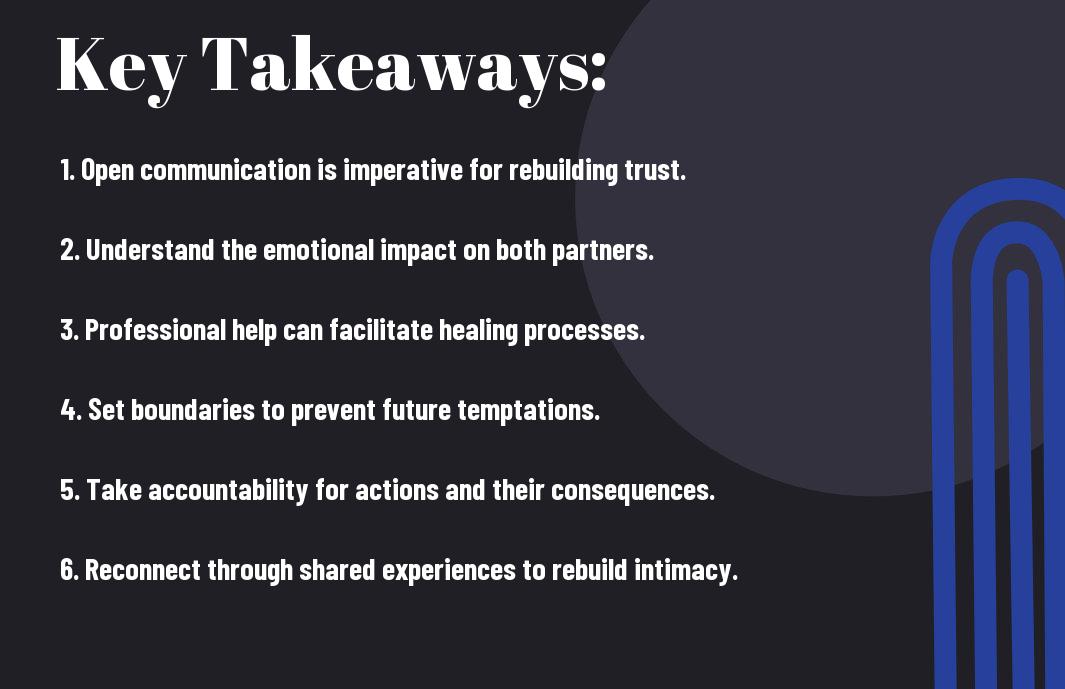Infidelity can deeply impact your marriage, especially when it involves a coworker. It’s important to address the emotional fallout and trust issues that arise after such a betrayal. You need to understand that healing is a process that requires open communication, honesty, and a willingness to rebuild your relationship from the ground up. This post will guide you through the vital steps and considerations needed to navigate this difficult journey, helping you to not only survive the infidelity but to potentially emerge stronger as a couple.
Key Takeaways:
- Both partners must openly communicate their feelings and concerns for effective healing.
- Understanding the underlying issues that led to the infidelity is necessary for rebuilding trust.
- Setting clear boundaries with the coworker involved is necessary to prevent future issues.
- Engaging in couple’s therapy can provide guided support and new perspectives during the healing process.
- It’s important to take time for self-reflection for both partners to foster personal growth.
- Patience and commitment are vital, as rebuilding trust takes time and effort from both sides.
- Establishing a shared vision for the future can help couples reconnect and move forward together.

Understanding Infidelity
The journey through infidelity can be a complex and heartbreaking experience for couples. Understanding what constitutes infidelity and its repercussions on a relationship is vital for those seeking to navigate the tumultuous waters of betrayal. You must confront the emotional and relational challenges head-on to facilitate healing and repair within your marriage.
Defining Infidelity
Infidelity encompasses a breach of trust in a committed relationship, often characterized by emotional or physical involvement with someone outside of your marriage. It can manifest in various forms: from secretive texting and emotional affairs to physical encounters. Each situation may carry different implications, but the core violation remains the same—you have stepped outside the bounds of your marital commitment.
The Impact of Infidelity on Marriage
Behind the betrayal of infidelity lies the potential to shatter the foundation of your marriage. It can lead to intense feelings of betrayal, anger, and confusion, frequently resulting in a breakdown of effective communication between partners. Trust is significantly eroded, and rebuilding it becomes a painstaking process. The emotional turmoil can yield feelings of inadequacy and shame, which often extend beyond the immediate couple to affect family dynamics and friendships.
In addition, the repercussions of infidelity can vary greatly depending on your unique circumstances. Some couples may find that they develop a deeper understanding of one another during the healing phase, ultimately strengthening their relationship. Conversely, others may face escalating conflicts and potential separation as unresolved feelings come to the surface. Recognizing these potential outcomes will help you prepare for the emotional journey ahead, ensuring you make informed decisions about your relationship’s future.
The Role of Coworkers in Infidelity
Even in a professional environment, the lines between friendship and intimacy can blur, significantly impacting your marriage. Coworkers often share personal stories and develop deep emotional connections, which can unwittingly create opportunities for infidelity. In such scenarios, the workplace becomes a breeding ground for temptation, making it vital for you to maintain boundaries and be aware of the influences around you.
Workplace Dynamics and Temptation
On a daily basis, you navigate various workplace dynamics that can fuel the risk of infidelity. Long hours spent with coworkers and shared challenges can lead to a sense of camaraderie that sometimes evolves into inappropriate relationships. The familiarity developed in a professional setting can create an environment where lines become easily crossed, making communication about expectations and boundaries vital.
Emotional vs. Physical Affairs
On a deeper level, distinguishing between emotional and physical affairs is vital for understanding the impact of infidelity on your marriage. Emotional affairs often involve an intense connection with another person, prioritizing intimacy and dialogue over physical interactions. Conversely, physical affairs are characterized by sexual encounters—these affairs can be easier to identify but often come with significant emotional fallout as well.
Consequently, you must understand that both emotional and physical affairs can have devastating effects on your relationship. Emotional affairs can lead to a profound disconnect with your spouse, often causing feelings of betrayal and inadequacy, as your partner seeks emotional support from someone else. On the other hand, physical affairs may result in doubt and mistrust, fundamentally damaging the foundation of your marriage. Addressing these issues openly is vital in the healing process, enabling you to rebuild your marriage with a clearer understanding of boundaries and commitments.
Initial Steps to Repairing the Marriage
Keep in mind that repairing your marriage after infidelity requires commitment and effort from both partners. You will need to create a safe environment to heal, allowing each other to express feelings without judgment. Emphasizing respect and understanding is vital during this challenging time, as it lays the foundation for rebuilding trust and intimacy. Setting a timeline for healing can also help you stay focused and dedicated to the process.
Acknowledgment and Accountability
With both partners acknowledging the infidelity, you establish a clear understanding of the hurt caused. It is vital for the betraying spouse to take full responsibility for their actions and express genuine remorse. This transparency fosters trust while demonstrating your commitment to repairing the relationship. By openly discussing feelings and consequences, you both pave the way for healing and a renewed partnership.
Open Communication Strategies
Strategies for open communication are vital for rebuilding trust after infidelity. You should create a safe space for sharing your thoughts and feelings, which encourages honest dialogue and mutual understanding. Establishing ‘no interruption’ guidelines can foster respect during discussions, allowing both partners to speak freely. Regularly scheduled check-ins can help keep communication lines open and ensure you are both on the same page.
And as you move forward with open communication strategies, it’s important to practice active listening and empathy. By reflecting back what your partner says, you demonstrate that you value their thoughts and emotions. Engaging in non-confrontational conversations can help you avoid defensiveness, allowing you to tackle sensitive topics peacefully. Consider employing tools like journal writing or couples therapy to facilitate deeper discussions. Keeping an open dialogue not only strengthens trust but also assists in navigating the emotional complexities that arise during this healing journey.

Seeking Professional Help
For many couples, navigating the aftermath of infidelity can feel overwhelming. Seeking professional help can provide necessary guidance and support, allowing you to process emotions and rebuild trust. A skilled therapist can facilitate tough conversations and help both partners understand the underlying issues that contributed to the affair. Engaging in therapy can create a safe space for healing and ultimately foster a stronger relationship moving forward.
Couples Therapy
Professional couples therapy can be an effective way to address the complexities of your relationship after infidelity. A trained therapist will guide you both through difficult discussions, enabling you to express your feelings, needs, and fears in a constructive manner. This approach helps rebuild trust and encourages open communication, making it easier to work through the pain caused by betrayal.
Individual Counseling
With individual counseling, you have the opportunity to explore your personal feelings and experiences outside of the partnership. This specialized support allows you to reflect on your emotions and how they affect your relationship.
Help from an individual counselor can provide you with a deeper understanding of your own needs and triggers. This process allows you to address betrayal, guilt, and anxiety that may arise post-infidelity. Working through your feelings independently can empower you to make better choices within your relationship. You’ll also gain coping strategies, enabling you to manage your emotions more effectively, which can ultimately lead to healthier interactions with your partner.

Rebuilding Trust
Now is the time to focus on rebuilding the trust that has been shattered by infidelity. This process requires patience, consistent effort, and a commitment to honesty from both partners. You need to create an environment where open communication is encouraged, allowing both to express feelings and concerns openly. Recognizing that trust is not rebuilt overnight is key; it takes time and mutual commitment to achieve a stronger, more resilient relationship.
Steps to Restore Trust
Any path to restoring trust begins with honest conversations about feelings and experiences surrounding the affair. You must prioritize accountability by openly discussing what led to the infidelity and clearly addressing your mistakes. Regularly check in with your partner and actively listen to their concerns, reinforcing your commitment to change and emotional availability. Setting boundaries regarding communication, especially regarding interactions with the coworker involved, is crucial in the journey of healing.
The Importance of Transparency
After infidelity, transparency becomes more than just a principle; it is a lifeline that can dramatically influence the healing process. You should openly share information about your daily activities, feelings, and relationships, ensuring your partner no longer has to second-guess your intentions. This creates a sense of security you both need during this challenging time.
Even small acts of openness can significantly impact the rebuilding process. Make it a habit to share your whereabouts, feelings, and interactions with others, specifically if they involve individuals who may pose a risk to your commitment. Maintain an atmosphere of honesty and vulnerability, allowing your partner to feel included in your life. When you demonstrate transparency, you are actively dismantling the walls of suspicion that may hinder your relationship’s progress and fostering a deep sense of trust and emotional safety.
Moving Forward Together
Not every couple can successfully rebuild after infidelity, but it is possible with dedication and effort. A vital aspect of recovery is understanding that healing takes time, and you can begin this journey by recognizing the stages of pain involved in Coping with Infidelity: The 2 Stages of Pain. Acknowledging your emotions, communicating openly, and seeking professional guidance can foster a stronger, healthier relationship as you move forward together.
Creating a New Foundation
For a successful recovery, both of you must actively participate in creating a new foundation for your relationship. This involves redefining your goals, values, and vision for your partnership. You should collaborate on rebuilding trust and intimacy by being transparent and honest about your feelings and expectations. Establishing shared activities can also deepen your bond, enhancing companionship as you navigate this journey.
Setting Boundaries to Protect the Relationship
For sustainable healing, it’s vital to establish boundaries that protect your relationship from similar threats in the future. This means being clear about acceptable behaviors and communication patterns, especially regarding your interactions with others, including coworkers. Open discussions about these boundaries will empower both of you to feel secure and valued in the relationship.
Also, these boundaries are not just limitations; they are empowering agreements that can enhance your emotional safety. Set limits on interactions with individuals outside your relationship, particularly those who may be triggers for past trauma. Establishing a rule to communicate openly about any discomfort is vital—this way, you can address potential issues before they escalate. Prioritize trust, honesty, and respect in your interactions to ensure a solid recovery, paving the way for a healthier, more resilient partnership.
Summing up
With this in mind, navigating marriage repair after infidelity with a coworker requires open communication, honesty, and a willingness to rebuild trust. You must acknowledge the pain caused, prioritize your partner’s feelings, and seek to understand the underlying issues that led to the affair. Consider professional guidance to facilitate healing and establish new boundaries. Be patient with yourself and your partner as you work through feelings of betrayal and forge a stronger, more resilient relationship moving forward.
FAQ
Q: What are some initial steps to take after discovering infidelity with a coworker?
A: It’s important to first process your emotions. Take time to understand how you feel and what has happened. Once you feel ready, have an open and honest conversation with your spouse about the situation. Discuss the issues that led to the infidelity, the impact it has had on your marriage, and your feelings. Seeking support from a therapist or counselor can provide a safe space to navigate these conversations and develop a plan for moving forward.
Q: How can communication be improved in a marriage after infidelity?
A: Open communication is key in rebuilding trust. It’s imperative to create a safe environment for both partners to express their feelings without fear of judgment. Set aside regular times for check-ins where both partners can share their thoughts and concerns. Use active listening techniques and try to understand each other’s perspectives. Therapy can also facilitate better communication skills and help both partners express themselves more effectively.
Q: Is it possible to rebuild trust after infidelity, and how long might it take?
A: Yes, it is possible to rebuild trust after infidelity, but it takes time and effort from both partners. The timeline can vary greatly depending on the individuals and specific circumstances, but it typically takes months to years to fully restore trust. This process involves consistent honesty, transparency, and accountability from the partner who was unfaithful, as well as openness and willingness to forgive from the other partner.
Q: What role does counseling play in the recovery process after infidelity?
A: Counseling can play a significant role in the recovery process by providing a neutral space for both partners to express their emotions and work through complex feelings. A skilled therapist can help couples understand the underlying issues that led to infidelity, improve communication skills, and guide them through the process of rebuilding their relationship. Counseling can also offer coping strategies and support for individuals who may be struggling with their feelings during this difficult time.
Q: How should couples approach the topic of boundaries in the workplace after infidelity?
A: Establishing boundaries is important to prevent future issues and restore trust. Discuss what constitutes professional behavior and agree on what interactions are acceptable in the workplace, particularly regarding the coworker involved in the infidelity. This might include limiting contact or discussing the need for complete transparency about work-related interactions. Regularly revisit this topic to ensure both partners feel comfortable and secure in their agreement.
